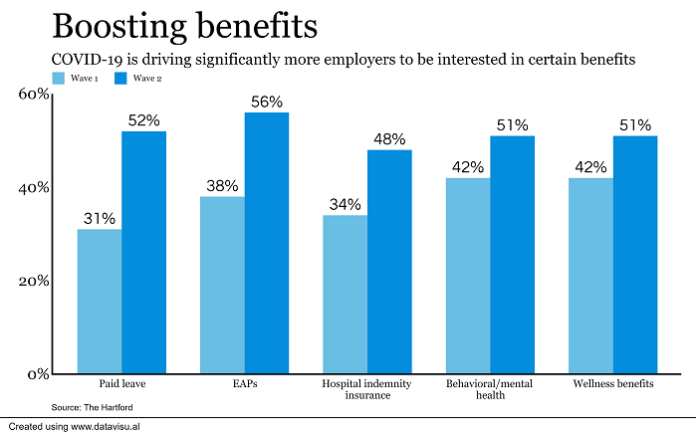Most employees think the pandemic is making benefits more important than ever.
New research from Prudential finds that workers report a significant increase in the value they place on the benefits offered by their employers, including a double-digit increase in how likely they are to remain at a job based on non-health benefits such as retirement savings, disability insurance, life insurance and other tools to help alleviate financial stress.
Employed respondents overwhelmingly say their benefits programs make up a key part of their compensation (77%, up from 67% from a year ago) and are a big reason they would stay at a job (73% versus 59%). Three-quarters of employees say the pandemic makes them feel benefits through an employer are now “more important than ever before.”
“The value employees are now placing on their workplace benefits is similar to the value that employers are now placing on the ability to operate virtually–what was once considered a nice-to-have option is now viewed as essential,” says Leston Welsh, head of business segments at Prudential Group Insurance.
 Respondents also say they would “be willing to take a chance on a new job right now if it offered better benefits”–a surprising statistic given the uncertainties of today’s job market.
Respondents also say they would “be willing to take a chance on a new job right now if it offered better benefits”–a surprising statistic given the uncertainties of today’s job market.
“Most of us are either directly impacted by being furloughed, laid off or receiving a reduced income, or we know someone who is,” Welsh explains. “The pandemic has driven home the idea that no one is immune to unexpected life events that can disrupt their income. The dangers of an ‘it won’t happen to me’ mentality are now very clear, and employees are placing greater value on benefits because they are more aware of how these benefits can help them during a life event, including paying for high out-of-pocket medical costs and hospital visits.”
Many employees may have tapped into their emergency savings, withdrawn from their retirement plan or reduced contributions to their retirement plans to cover expenses they did not plan for, including medical or caregiving costs, Welsh adds. “Therefore, many families are looking at their employer-provided benefits trying to figure out how they recover and get back on track to be financially well.”
COVID-19 also has increased the importance of mental health offerings, as rates of depression, stress, anxiety and burnout have soared in response to the pandemic.
Related: 10 strategies to improve employees’ mental health
Prudential’s findings only increase the importance of employer education and communication ahead of enrollment season, experts say. Employers and HR leaders should soften the burden of understanding what benefits might be needed as employees navigate other financial, physical and mental stressors of COVID-19, Welsh says.
[click_to_tweet tweet=”As #openenrollment approaches, learn why #COVID19 is driving the value of #employeebenefits ” quote=”Tweet this story” theme=”style3″]
“Employees tend to select the same benefits that they had the year before. This year, however, most of our living and working situations have changed in one way or another. Employees will need better information and more time to analyze how a different set of benefits may be better suited for their new normal,” he says. “A different hierarchy of benefits may be driven not only by a heightened awareness of what benefits are offered, but also by an understanding of how today’s environment impacts what is offered and how these solutions address new and different needs.”



